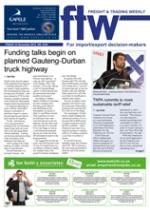Economic and political
developments in Nigeria
and South Africa will
continue to have a direct
impact on the other
countries in the region,
according to International
Monetary Fund (IMF)
African Department senior
economist Cheikh Gueye.
The two countries
account for 50% of sub-
Saharan Africa’s GDP, and
their growth (or otherwise)
will determine the demand
for shipping, transport and
associated services across
the region.
“On the investment
side, we have noticed that
South African companies
are investing in the rest
of Africa, and this has
an impact in shaping
trade flows,” he said in
an interview with IMF
Survey Magazine.
“Third, there are
linkages in the financial
system. Since 2005,
Nigerian banks have
extended their operation
in many countries in sub-
Saharan Africa. That is
also true of South African
banks.”
There are almost
44 subsidiaries of
Nigerian banks in about
32 countries, and any
banking crisis in Nigeria
will have a knock-on
effect, he says.
South Africa’s
direct influence on its
neighbours is through the
South African Customs
Union. A decline in
imports to South Africa
will see a drop in revenue
to the other members of
the union in terms of the
customs revenue sharing
formula.
In the case of Nigeria,
the IMF estimates that a
3% increase in inflation
in Nigeria may have an
impact of around 1% on
neighbouring countries.
Continent catches a cold when Nigeria and SA sneeze
23 Nov 2012 - by Ed Richardson
0 Comments
FTW - 23 Nov 12

23 Nov 2012
23 Nov 2012
23 Nov 2012
23 Nov 2012
23 Nov 2012
23 Nov 2012
23 Nov 2012
23 Nov 2012
23 Nov 2012
23 Nov 2012
Border Beat
Poll
Featured Jobs
New
